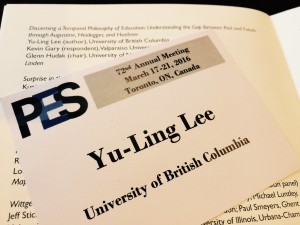This past weekend, on Mar 19, I had the privilege to share a paper at the Philosophy of Education Society 72nd Annual Meeting. The theme this year is: Philosophy of Education in the Gap between Past and Future. The phrase comes from Hannah Arendt’s preface to Between Past and Future which challenges our understanding of sustained thinking in the hopes of redirecting educational thinking, policy and practice. In that vein, I wrote a paper, Discerning a temporal philosophy of education: Understanding the gap between past and future through Augustine, Heidegger, and Huebner.
Here’s the introduction:
Over forty years ago, Dwayne Huebner began questioning “the hegemony of the notion of ‘learning’ in education”[i] and found an “overvaluing of scientific language.”[ii] This privileging of the modes and methods of educational psychology or “concept-empiricism”[iii] enables the self-promotion of learning, and in turn, relegates teaching to a mere function of learning in education. For Huebner, this matter of “learning” imposes “technical pseudo-scientific language”[iv] onto education, which exemplifies the challenge of language and its role in educational praxis. The curricular field is still largely obsessed with teaching metrics, programmed learning outcomes, and school objectives which are produced in advance of the lived experiences of students within an educational framework. These mechanized values point to an inauthentic understanding of time due to a curricular and pedagogical orientation built on a determinate and preordained educational future. For Huebner, subjugating education under the auspice of learning is problematic as it diminishes the essence of our being into a very narrow condition.[v] To subsume our beingness within a framework of learning entails a philosophy of education directed by epistemological considerations to the preclusion of ontological concerns. Instead, this paper seeks to demonstrate an understanding of temporality as a way to critique the standard language of learning and create a discourse about authentic learning. Following Huebner, we note that his educational philosophy is inspired by Heidegger and the phenomena of temporality and historicity. In turn, Heidegger’s understanding of time is largely developed from his study of Augustine. This paper, then, traces the conceptualization of temporality through the trinity of Huebner, Heidegger, and Augustine. Accordingly, one way to understand the “gap between past and future”[vi] is to conceive of authentic learning within the existential-phenomenological tradition by discerning a temporal understanding of life that advocates for our ontological potentialities and possibilities as human beings.
[i] Ted T. Aoki, “Signs of Vitality in Curriculum Scholarship,” in Curriculum in a New Key, eds. William F. Pinar and Rita L. Irwin (New York: Routledge, [1985] 2005), 230).
[ii] Dwayne E. Huebner, “New Modes of Man’s Relationship to Man,” in The Lure of the Transcendent: Collected Essays by Dwayne E. Huebner, ed. Vikki Hillis (New York: Routledge, [1963] 2008), 87.
[iii] William F. Pinar, “The Reconceptualization of Curriculum Studies,” in The Curriculum Studies Reader, eds. David Flinders and Stephen Thornton (New York: Routledge, 2009), 171.
[iv] William F. Pinar, “Introduction,” in The Lure of the Transcendent: Collected Essays by Dwayne E. Huebner, ed. Vikki Hillis (New York: Routledge, 2008), xxii.
[v] Dwayne E. Huebner, “The Capacity for Wonder and Education,” in The Lure of the Transcendent: Collected Essays by Dwayne E. Huebner, ed. Vikki Hillis (New York: Routledge, [1959] 2008), 6.
[vi] Hannah Arendt, Between Past and Future: Six Exercises in Political Thought (New York: The Viking Press, 1961), 13.


 Follow
Follow